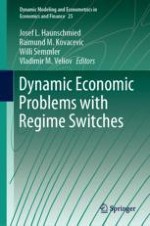
2021 | OriginalPaper | Buchkapitel
1. Managing, Inducing, and Preventing Regime Shifts: A Review of the Literature
verfasst von : Ngo Van Long
Erschienen in: Dynamic Economic Problems with Regime Switches
Aktivieren Sie unsere intelligente Suche, um passende Fachinhalte oder Patente zu finden.
Wählen Sie Textabschnitte aus um mit Künstlicher Intelligenz passenden Patente zu finden. powered by
Markieren Sie Textabschnitte, um KI-gestützt weitere passende Inhalte zu finden. powered by